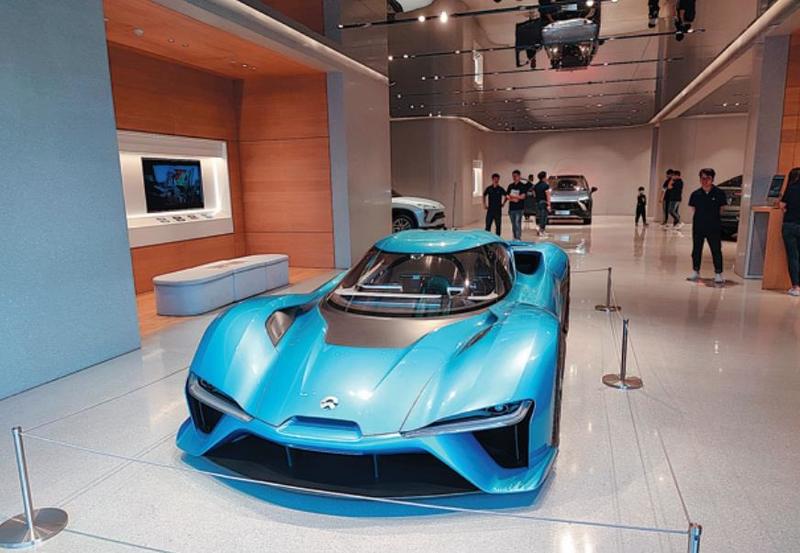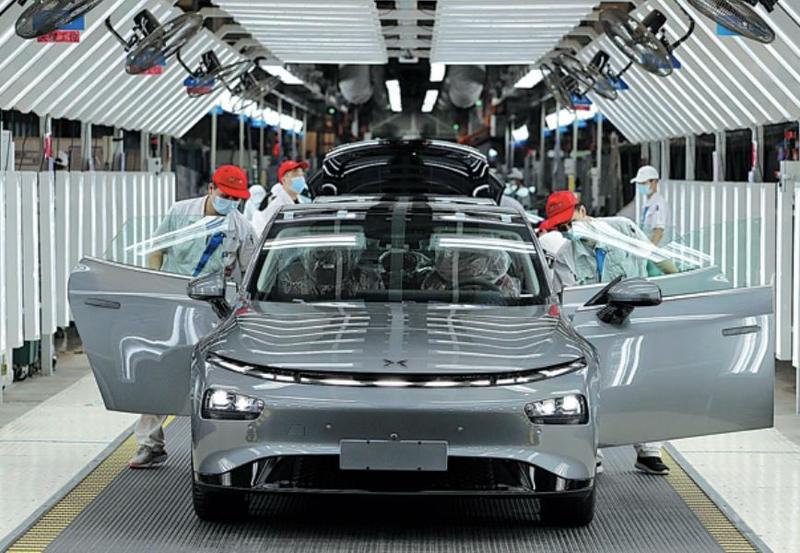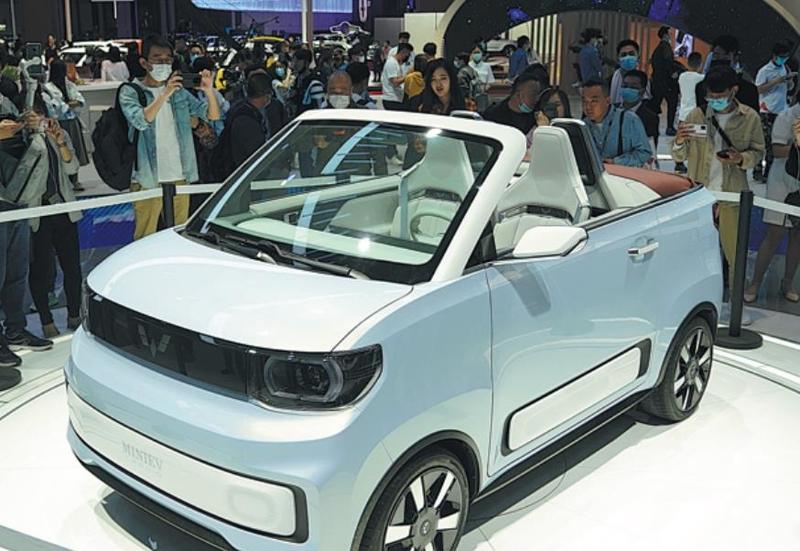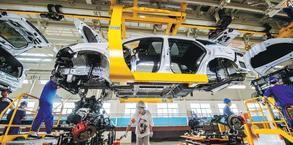 In this undated file photo, the EP9, a new sports car from Chinese electric car startup Nio, is displayed at the company's flagship showroom in Shanghai. (CHEN YUYU / FOR CHINA DAILY)
In this undated file photo, the EP9, a new sports car from Chinese electric car startup Nio, is displayed at the company's flagship showroom in Shanghai. (CHEN YUYU / FOR CHINA DAILY)
For the past month or so, Zhang Yanjie has spent most of his time after work visiting car websites, going to dealerships and taking test drives.
The 36-year-old Beijing lawyer has narrowed his shortlist for a new electric vehicle to three candidates-a BYD Han, a Xpeng P7 and a Tesla Model 3.
Zhang said he will discuss the choice with his wife, who works as an office clerk, before making a final decision. Whichever model he picks, the biggest losers are dealers selling cars powered by gasoline.
"Charging an electric car makes a lot of sense financially compared with filling a vehicle with gasoline," he said.
Other factors helping tip the balance in favor of electric cars include quicker acceleration and visible technology.
"Big screens and other items are cool, as many of these features are controlled by voice command. You simply say 'turn on the radio' or 'turn on the air conditioner' and it is done," he said.
Zhang and his wife are new fans of China's burgeoning new energy vehicle, or NEV sector, which comprises electric cars, plug-in hybrids and fuel cell vehicles.
The China Passenger Car Association said sales of electric and plug-in hybrid family cars in the nation reached 1.1 million in the first six months of this year, accounting for 46.5 percent of the global total
By the end of June, there were 6.03 million such vehicles on the nation's roads, according to the China Association of Automobile Manufacturers.
More than 1.2 million NEVs were sold in the first half of this year, of which around 80 percent were electric cars-a rise of over 200 percent from the same period last year. The proportion of NEVs in total new vehicle sales rose to 9.4 percent by the end of June, up from 5.4 percent for the whole of last year.
The popularity of NEVs is even more apparent when it comes to family cars, including sedans, sport utility vehicles and multi-purpose vehicles.
The China Passenger Car Association said sales of electric and plug-in hybrid family cars in the nation reached 1.1 million in the first six months of this year, accounting for 46.5 percent of the global total.
Europe, which is stepping up its electrification campaign, came second with 38.2 percent, followed by the United States with 11.5 percent.
Analysts at Everbright Securities estimate that NEV sales in China could reach 2.7 million this year, thanks to growing demand, manufacturers rolling out new vehicles, and the nation's firm commitment to the sector.
ALSO READ: MOC: China's NEV sales hit historic high in first 7 months
According to global consultancy Accenture, in China, some 68 percent of people owning cars fueled by gasoline said they would buy an NEV as their next vehicle.
Support for accelerating development of the sector was announced after a meeting of the Political Bureau of the Communist Party of China Central Committee on July 30.
Fu Yuwu, honorary chairman of the China Society of Automotive Engineers, said he was "excited and exhilarated to learn of this momentous decision".
"It will prove to be another big boost to the already fast-developing NEV industry," Fu said in an interview with China Automotive News.
He added that the focus will not only be on increasing market size, but also on making breakthroughs in core technologies to help China consolidate its leading position in the market.
 Workers assemble cars at Xpeng Motors' production base in Zhaoqing, Guangdong province, in April 2021. (WANG ZHUANGFEI / CHINA DAILY)
Workers assemble cars at Xpeng Motors' production base in Zhaoqing, Guangdong province, in April 2021. (WANG ZHUANGFEI / CHINA DAILY)
Qin Lihong, president of Chinese electric car startup Nio Inc, said support for the sector highlights its strategic importance, paving the way for further development.
"We (Chinese companies) are already at a great starting point and we should seize the opportunities to prepare for competition in the next 10, 20 or even more years to come," he said.
Thanks to a clear strategy and generous subsidies, China has been the leading market for electric cars and plug-in hybrids since 2015. Its first-mover advantage and vast market have seen local companies enhance their reputations globally
In 2009, China started to develop the sector in earnest at a time when many other countries thought it was too early to do so. NEVs are expected to account for 20 percent of new car sales in 2025, rising to 40 percent in 2030 and 50 percent in 2035.
Thanks to a clear strategy and generous subsidies, China has been the leading market for electric cars and plug-in hybrids since 2015. Its first-mover advantage and vast market have seen local companies enhance their reputations globally.
For example, BYD, which is backed by United States investor and businessman Warren Buffett, sells its buses worldwide, while leading battery maker CATL is in demand among car giants such as BMW and Daimler to power their electrification campaigns.
Chinese electric car startups, including US-listed Nio and Xpeng Motors, are now serious challengers to Tesla in terms of brand awareness and products.
Since its launch in July last year, the Wuling Hongguang mini car, with its styling and affordability, has been the most popular electric vehicle in China.
Duan Yan, a representative from the company, said more than 200 car dealers from a total of 70 or so countries and regions had been in touch to say they wanted to sell the model if it was exported.
International carmakers are tapping into the Chinese market and manufacturing expertise. Volkswagen, which is launching five electric car models in China this year, expects their combined sales to reach 100,000 by the end of December.
ALSO READ: Tesla hits a bump at Shanghai auto show
Tesla is busy building charging infrastructure for a rising number of Chinese customers. Annual capacity at its Shanghai plant, which started production in late 2019, has just been raised to 450,000 vehicles.
International carmakers are tapping into the Chinese market and manufacturing expertise. Volkswagen, which is launching five electric car models in China this year, expects their combined sales to reach 100,000 by the end of December
The company said in a statement, "Due to strong US demand and global average cost optimization, we have completed the transition of Gigafactory Shanghai as the primary vehicle export hub."
Cooperation opportunities
While China is leading the transformation toward electrification, the European Union and the US have announced far-reaching plans in this regard.
This month, the US government set a target for NEVs to comprise 50 percent of the nation's car sales by 2030.
Large US carmakers, including General Motors and Ford, which are expected to contribute a significant proportion of the sales, said the target would mark a dramatic shift for the domestic market.
According to PwC, from January to June, such vehicles accounted for only 3 percent of total sales in the US-the second-largest vehicle market after China.
In a joint statement, GM and Ford said the 50 percent goal "can be achieved only with the timely deployment of the full suite of electrification policies".
This would involve "purchase incentives, a comprehensive charging network of sufficient density to support the millions of vehicles these targets represent, investments in research and development, and incentives to expand the electric vehicle manufacturing and supply chains in the United States".
Cui Dongshu, secretary-general of the China Passenger Car Association, said the massive shift by the US toward electrification would help promote the transformation led by China, adding that there is huge potential for cooperation.
 The Hongguang Mini EV Cabrio, produced by Wuling, is displayed at Auto Shanghai 2021 in April 2021. (DING TING / XINHUA)
The Hongguang Mini EV Cabrio, produced by Wuling, is displayed at Auto Shanghai 2021 in April 2021. (DING TING / XINHUA)
"There will be more cooperation than confrontation. Chinese companies can play a part in American carmakers' supply chain as they go electric, and their (US manufacturers') technological innovation is beneficial to Chinese companies as well," Cui said.
Among other things, CATL provides batteries for Tesla vehicles made in China, BYD is reportedly to supply Tesla, and Ford's China-made electric Mustang, the Mach-E, is equipped with BYD batteries.
There will be more cooperation than confrontation. Chinese companies can play a part in American carmakers' supply chain as they go electric, and their (US manufacturers') technological innovation is beneficial to Chinese companies as well.
Cui Dongshu, secretary-general of the China Passenger Car Association
The presence of such Chinese companies emerged at an early stage in Europe, where a ban on gasoline vehicles is being considered in European Union nations from 2035.
In 2019, construction began on a CATL manufacturing plant in the German state of Thuringia. The company said local production of battery cells would start in the second half of next year.
Meanwhile, Gotion High-tech Co, based in Anhui province, will act as a technology partner to help Volkswagen produce battery cells at the carmaker's plant in Salzgitter, Germany.
Roy Lu, a Gotion executive, said, "Europe is trying to catch up in terms of battery technology, so local carmakers and governments want to invite competent companies over to help boost the sector."
Another Chinese company, Envision AESC, will build a $2.4 billion battery plant in France to supply Renault. Envision aims to produce 9 gigawatt hours of batteries in France in 2024 and 24 GWh by 2030.
ALSO READ: Volkswagen consolidates leading position in the Chinese market
Cooperation is not limited to batteries. Volkswagen is working on advanced driver assist functions with China's DJI, which is better-known for its drones.
Ford said it will put to use in the US the experience gained from China.
Jim Farley, Ford CEO, said in an earlier interview, "We see China's customers as the most advanced in terms of the digital consumer experience.
"For us to be successful … this is the know-how we can apply around the world, especially in our home market."
'New normal' cars
Despite the meteoric rise of China's electric car market, executives said some adjustments may be needed to ensure this robust growth continues.
The 1.02 million electric vehicles sold in the first six months of this year marked a year-on-year rise of 244 percent. However, the best-selling models were more-affordable mini cars, such as those from Wuling, and also desirable but expensive vehicles from companies including Tesla.
Statistics from the China Passenger Car Association show that 46 percent of electric models on the market are mini and subcompact vehicles. This means there are few choices for middle-class owners considering, for example, replacing a Volkswagen Sagitar, Ford Focus or Buick Lavida with an electric car.
Volkswagen Group China CEO Stephan Woellenstein said if the current "dumbbell-shaped pattern "does not develop into an "olive-shaped one", as seen in the gasoline market, it will be difficult for China to realize the goal of new energy vehicles accounting for 40 percent of total car sales by 2030.
"If we want new energy vehicles to become the new normal, we need normal new energy vehicles," Woellenstein said.
Freeman Shen, founder and CEO of Chinese electric car startup WM Motor, who is a former Volvo executive, said: "There was a time when many carmakers thrived on mini cars, but they soon died out. People want better and larger vehicles as they become wealthier."
 This undated file photo shows workers in the assembly line at BYD's electric vehicle factory in Xi'an, Shaanxi province. (YUAN JINGZHI / FOR CHINA DAILY)
This undated file photo shows workers in the assembly line at BYD's electric vehicle factory in Xi'an, Shaanxi province. (YUAN JINGZHI / FOR CHINA DAILY)
The market situation has started to change. Chinese and international carmakers operating in China plan to launch 54 NEV models this year, most of them for the mainstream market, according to Everbright Securities.
Qin, from Nio, said that while most carmakers are starting to offer electric vehicles, being electric alone is not enough to survive in an increasingly competitive market.
"The next litmus test lies in whether these vehicles are smart, with autonomous driving as the most prominent feature," Qin said.
Nio said China should place greater emphasis on chip design and production, as smart vehicles will require more-advanced semiconductors than those powered by gasoline.
Wang Jun, head of Huawei's smart car business unit, said the company is working on offering driverless solutions, which are expected to be announced around 2025, after which the emphasis will be on smart onboard functions.
Nio said China should place greater emphasis on chip design and production, as smart vehicles will require more-advanced semiconductors than those powered by gasoline
"Vehicle cabins will become smart spaces. We don't know the exact extent of the possibilities, but there are boundless opportunities," Wang said.
He Xiaopeng, CEO of Chinese startup Xpeng, said smart vehicles will be like smartphones.
"They will be much more than transportation tools, just as the primary function of smartphones is not making calls. In fact, we have noticed that many of our customers remain in their vehicles for quite a while after they have parked them," he said.
Xpeng said that as sales of electric cars continue to rise, the popularity of vehicles with some smart functions will surge in the next one to two years.
The influx of Chinese technology companies, including Huawei and Baidu, into the car market is helping to speed up this process.
"I would say that 2023 will be a turning point. In 2025, 60 percent of new cars sold in first-tier cities will be electric, and 50 percent of them will have smart features," He said.
Zu Sijie, chief engineer at SAIC Motor, a partner of GM and Volkswagen, said Chinese carmakers will become leading players globally in the era of smart vehicles.
International companies took the lead in introducing the latest technology into local car joint ventures in the age of gasoline vehicles. In turn, Chinese companies are performing this role as vehicles become smart, connected and autonomous, Zu said.
Chinese companies are moving quickly and investing heavily in such technology.
SAIC has earmarked a budget of 300 billion yuan (US$46.29 billion) by 2025, with the aim of becoming a technology company focused on smart and electric vehicles.
Li Jun, CEO of SAIC subsidiary Z-One, said it has completed an "electric car architecture" almost capable of Level 3 functions-allowing drivers to take their hands off the steering wheel and their eyes off the road.
READ MORE: BYD building all its EVs with 'safer' blade-shaped battery
Such an architecture capable of Level 4 functions-enabling vehicles to drive themselves under most circumstances-would be unveiled in 2023, he said.
Z-One has also launched a digital platform that functions like Google's Android system for smartphone makers and users.
The platform, the first of its kind in the auto industry, allows software developers to code and release car-based applications in an app store. Car owners can download and install them in their vehicles, making each car unique in terms of user experience.
"We want to transform limited car cabins into limitless possibilities," Li said.


